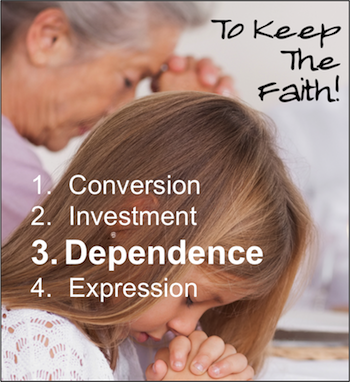Dependence: Developing Loyalty to the Spiritual Network

The third area that must be developed, in order for our children to keep the faith, is dependence upon their spiritual social network.
Dependence Upon the Youth Group
I vividly remember the first time this principle affected my life. As a young Christian growing up in the mountains of central Pennsylvania, the social network of our small congregation was essential to my spiritual survival. Churches within our fellowship were very few and far between. It was a common occurrence to drive many miles just to spend a couple of hours with other Christian youth.
Sundays were a highlight of every week. The youth group always sat together during worship service (second pew from the front on the left). We loved to sing and were often depended upon to carry the songs during worship.
Afterwards, the youth group spent the entire day at the building. We played games, did homework, and just hung out. We were family.
High school was especially challenging. I attended a very large public school with all the typical social pressures. Christians were bullied. Alcohol and other drugs were common and teen sex was expected. As a young athlete trying to excel at sports and still survive spiritually, my youth group was like the ultimate support group. Meeting these friends in the lunchroom or at study hall was like stepping out of a dark alley and into a safe haven of family. Weekends with the youth group kept me away from the drunken sex orgies that often destroyed other members of my sports teams. My church social network was essential.
Years passed and I encountered this dynamic again.
After graduating from college, I was hired to serve as youth minister for a congregation of more than 700 members. The youth group by itself was larger than many congregations (over 100 young people).
My first challenge was learning how to effectively serve a group that size without neglecting those who needed individual attention. I soon realized there was not enough of me to spread around to all of them. That's when the power of community and positive peer pressure became evident again. Within this large youth group, God had blessed me with several mature members and I quickly learned to utilize their abilities.
It was during this challenging time that I also discovered the great longing that young people have for a spiritual support group. On Sunday nights, after the traditional services, we would gather at a member's house for a youth group prayer meeting. As we would sit in a circle, paper and pencils would be distributed. Each person was asked to write down the prayer requests made by other members of the group and to pray about them during the week.
Slowly, we worked our way around the room giving everyone a chance to speak. Many times, young people broke down and cried as they confided in the group the pain they were experiencing. Kids would rush across the room to offer their love. On many occasions, the entire process was paused in order to give young people the opportunity to offer advice and console each other. They were family.
The success of this simple activity was overwhelming. We quickly discovered that teens would often come to prayer meetings when they would not come to events planned with "fun and games." One Sunday evening, we had over sixty teens turn out for prayer, but a week later, less than half of that number turned out for a party. Young people do NOT require a constant diet of fun and games to keep them loyal. They require a family - a spiritual social network.
Dependence Upon the Church Family
Today, I am the director of the Missionaries for America Program, an evangelistic training program for young people. Every summer I see this important principle play out in the lives of young people who come to us from all across the nation.
As each of the teams assemble then begin traveling, serving, and living together for weeks at a time, they learn to invest in each other. They are forced to work through personality quirks and develop group cooperation skills. They share belongings, do each other's laundry, mother each other through sickness, establish their own disciplinary peer pressures, and look out for the younger members of the team. In short, this “live together experience” forces the young people to invest in the success of their unit. They become a family.
The church needs more "live together experiences." She desperately needs to capture the unifying benefits of social networking.
For the church to keep the next generation, she must provide real-time, real-life relevance. The church must become the core of their social network.
Too often we have allowed our children to become social gluttons of the world's activities. Like limiting junk food before lunch, parents need to dial back their child's high caloric intake of the world's social events. Parents must help create within their child an appetite for social interaction with the church family.
Suggestions for Developing Dependence
• Take church family mission trips.
• Go on campouts as a group. (A ropes course can be a powerful tool to build unity.)
• Plan men's and women's retreats.
• Establish a Big Brother/Big Sister Program with the senior saints
• Plan regular family cookouts complete with family games. (Example: Have a tailgate party after Sunday services.)
• Support each other's events. Go to sporting events, piano recitals, award ceremonies, etc., of other church members and their children.
Conclusion
Hebrews 10:25 (NIV)
"Let us not give up meeting together, as some are in the habit of doing, but let us encourage one another---and all the more as you see the Day approaching."
It has always been assumed that this verse is talking about the Christian worship assembly. Read the context before and after. Is it possible that this verse is just as much about the importance of being together socially as it is about attendance at religious services?
In this verse, encouragement and meeting together are connected. What is it about simply being together that brings encouragement? What should this tell us about the importance of a Christian's dependence upon a social network?
When a church family only comes together three times a week to engage in formalized, pre-scripted meetings, intimate bonding is unlikely to occur. Without that bonding, young people are not likely to make long-term investments in the group. Create a spiritual social network on which young people are dependent and their loyalty to the church WILL be the result.
To continue this study, go to:
"To Keep The Faith! Expression: Celebrating Reverent, Relevant, Revealing Worship"
Missed the first five lessons of this series? Go to:
"To Keep The Faith!: Introduction"
"To Keep The Faith!: True Conversion"
"To Keep The Faith!: A Surgery at the Hands of Christ"
"To Keep The Faith!: A Healing from the Holy Spirit"
"To Keep The Faith! Investment: Taking Ownership of Their Place Within the Church"
Back to Top of "Dependence: Developing Loyalty to the Spiritual Network"
Back to The Church Page
Back to Home Page

